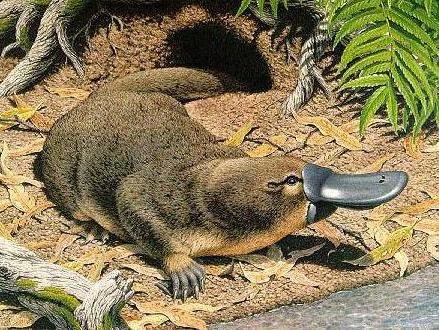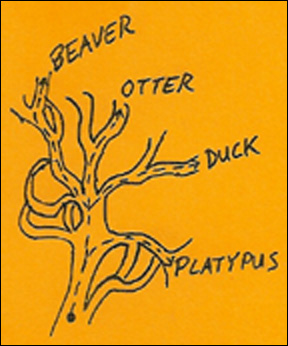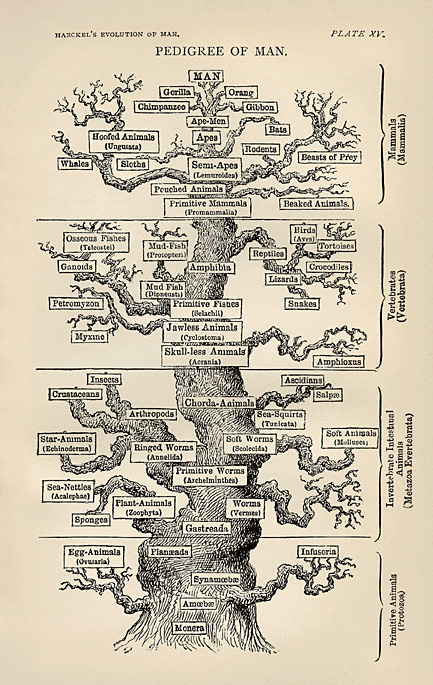When Charles Darwin published The Origin of Species in 1859, we learned more about God than we had in hundreds of years. We arguably learned more than we ever had from any other book, sacred or otherwise.
One could make the case that many revelations of God are really just advances in scientific understanding. In the very old days, we didn't know anything about nature, but we wanted to understand it. What were the amazing flashes in the sky and the loud noises that followed? What was the invisible coolness we felt on our faces that blew our hair? What was the incredible wet stuff that gave us life but could also drown us? What was the hot flickering that became the centerpiece of civilization but that also could consume us? We called it God! In all of his awe and wonder and terror, something to be loved and feared, that gave life and killed.
Specifically, it was gods. And eventually these gods were named. (Naming them was a step toward understanding.) What we now call thunder and lightning was Zeus or Thor or Indra, depending on where you lived. The wind was Njord or Fujin. And so on. Everything was a god, and God was everywhere you were. (It's difficult to speak of nature in this way now without sounding like a hippy, but I do wish we hadn't lost all of this belief. We would think twice about polluting the ocean if we thought that Poseidon might take his revenge. But we should think this way, because of course he will.)
The Greeks not only assigned gods to nature but to human feelings and ideas and experiences, like Laziness (Aergia), Peace (Irene), and Dreams (Morpheus). So not only was nature God, but so was everything you thought, felt, and experienced.
In early creation stories, like the Enuma Elish, the Mesopotamian epic of creation, you had Tiamat (primeval water) who was the grandmother of Anshar (heavens) and Kishar (earth). A storm wasn't just a storm: it was the great god Marduk. But in later creation stories, like Genesis, suddenly nature was just nature. Heaven and earth weren't gods, but God created the heavens and the earth. It may not sound like it now, but this was a scientific leap.
You often hear those who follow the Bible say that science pushes God out of the picture, but Genesis is the book that truly did so when it denied us the idea that we were walking among the gods. Before, if we looked at a rainbow or walked on the grass or touched a tree or even thought a thought or felt an emotion, we were experiencing communion with a god. But Genesis says that if you do these things, you are simply experiencing a bit of nature or a thought or feeling. (In fact, it had a word for those who retained their belief that a river was a god: idolaters.) God may have created these things, but he is somewhere far off, pushed out of the main picture. A demotion.
I said that I lament this loss of nature as God a little bit, but -- at the same time -- understanding nature is of course essential to not only a greater understanding of the way the world really works, but also to a better understanding of God. So what seems like God being pushed away is, in fact, God being revealed. Understanding Zeus is understanding a picture of God, but understanding lightning is understanding God as he truly is. This is where Darwin comes in.
Darwin addressed his opponents when he writes, "It is so easy to hide our ignorance under such expressions as the 'plan of creation,' 'unity of design,' etc., and to think that we give an explanation when we only restate a fact. Any one whose disposition leads him to attach more weight to unexplained difficulties than to the explanation of a certain number of facts will certainly reject my theory."
The same rejections certainly happened when the Hebrews said that there were not multiple gods, embodiments of nature, but that there was only one god who lived separate from nature. (The rejections were so strong, in fact, that the Hebrews were more or less forced to kill anyone who stood in their way to get this new truth across.) But apparently the Hebrews were scientific enough to realize that water was water and earth was earth. They also had some understanding of the separation of species, but they weren't scientific enough to understand where these species came from or how they fit together.
Charles Darwin, God's newest prophet, did. Darwin, by the way, never claimed to know where life came from. The name of the book is The Origin of Species, not The Origin of the Universe. And the origin of species is explained through the concept of natural selection, one of the most elegant concepts ever proposed, one that -- to this day -- fits with the way we are able to observe the way our world behaves and has always behaved.
Natural selection says that, as life continues, the traits that help us survive are retained while the traits that do not help us are abandoned. This does not happen quickly, of course. "Nature does not make leaps." The fact that we can't see it happening in front of our eyes is what makes some skeptical. But Darwin was able to see the evidence of natural selection on his voyages on the HMS Beagle, his communion with God. You can see the evidence of natural selection yourself if you travel to some place like the Galapagos islands (one of Darwin's stops) where certain animals are preserved in more ancient forms because of the protection afforded them by the island.
Because of his studies, Darwin was closer to understanding God than any writer of a "sacred" text. He says, "When we no longer look at an organic being as a savage looks at a ship, as at something wholly beyond his comprehension; when we regard every production of nature as one which has had a history; when we contemplate every complex structure and instinct as the summing up of many contrivances, each useful to the possessor, nearly in the same way as when we look at any great mechanical invention as the summing up of the labor, the experience, the reason, and even the blunders of numerous workmen; when we thus view each organic being, how far more interesting, I speak from experience, will the study of natural history become!"
And humans are smart enough now so that we're not "savage," not dumb animals. Humans, indeed, are a special case. The phrase "survival of the fittest" (a phrase coined by Herbert Spencer only after reading The Origin of Species) is somewhat misleading since we think of "fit" as being physically strong. Humans are that, but not in the usual way. We don't have very many specialized body parts the way many animals do (no claws, no fangs, nothing to dig with, no shells); in fact, we're rather exposed and defenseless. But we make up for that in our intelligence, and we do better than any animal as a result, no matter how big its teeth are. This is how natural selection worked in us. We passed on traits of intelligence (which allowed us to master tools) while discarding our fur, tails, and all the things we needed when we were more stupid.
 Another creature worth looking at in more detail is the platypus. A platypus is a furry mammal who lays eggs, has a bill like a duck's, has a tail like a beaver's, has feet like an otter's, and can shoot venom out of its ankle spurs. If you think that there is a god who creates each species individually, then you might say (as many have) that this god has a sense of humor. But he doesn't. The platypus is only funny-looking because we're used to seeing ducks, beavers, and otters as ducks, beavers, and otters. But to say the platypus has "a bill like a duck's" is misleading. A duck, in fact, has a beak like a platypus's.
Another creature worth looking at in more detail is the platypus. A platypus is a furry mammal who lays eggs, has a bill like a duck's, has a tail like a beaver's, has feet like an otter's, and can shoot venom out of its ankle spurs. If you think that there is a god who creates each species individually, then you might say (as many have) that this god has a sense of humor. But he doesn't. The platypus is only funny-looking because we're used to seeing ducks, beavers, and otters as ducks, beavers, and otters. But to say the platypus has "a bill like a duck's" is misleading. A duck, in fact, has a beak like a platypus's.Darwin explains why ducks, beavers, and otters are like platypuses (or Ornithorhynchus), and not the other way around, with his version of the Tree of Life. It's a long excerpt, but it's worth reading:
"The affinities of all the beings of the same class have sometimes been represented by a great tree. I believe this simile largely speaks the truth. The green and budding twigs may represent existing species; and those produced during each former year may represent the long succession of extinct species. At each period of growth all the growing twigs have tried to branch out on all sides, and to overtop and kill the surrounding twigs and branches, in the same manner as species and groups of species have tried to overmaster other species in the great battle for life. The limbs divided into great branches, and these into lesser and lesser branches, were themselves once, when the tree was small, budding twigs; and this connection of the former and present buds by ramifying branches may well represent the classification of all extinct and living species in groups subordinate to groups. Of the many twigs which flourished when the tree was a mere bush, only two or three, now grown into great branches, yet survive and bear all the other branches; so with the species which lived during long-past geological periods, very few now have living and modified descendants. From the first growth of the tree, many a limb and branch has decayed and dropped off; and these lost branches of various sizes may represent those whole orders, families, and genera which have now no living representatives, and which are known to us only from having been found in a fossil state. As we here and there see a thin straggling branch springing from a fork low down in a tree, and which by some chance has been favored and is still alive on its summit, so we occasionally see an animal like the Ornithorhynchus [platypus] or Lepidosiren [lungfish], which in some small degree connects by its affinities two large branches of life, and which has apparently been saved from fatal competition by having inhabited a protected station. As buds give rise by growth to fresh buds, and these, if vigorous, branch out and overtop on all sides many a feebler branch, so by generation I believe it has been with the great Tree of Life, which fills with its dead and broken branches the crust of the earth, and covers the surface with its ever branching and beautiful ramifications."
My crude illustration of some branches of this "Tree of Life":

This little picture isn't meant to be a scientific representation of the relation of these animals, but it does illustrate a couple of ideas. One, that some branches, as Darwin explains above, have died (become extinct) either because they simply die out or because they are overtaken by another "branches" or species. Note how some branches become blocked by others so that they can't survive anymore. This is similar to the ideas of Thomas Malthus who wrote about overpopulation and how this eventually gets remedied by sickness or lack of food or one species taking over another. (This is certainly something we do see within a lifetime.)
The other idea in this picture is the platypus and its relation to the animals that came from it. As Darwin explained, the platypus branch dipped down and so was able to avoid being blocked by other branches. (The platypus lived in Australia, where it wasn't threatened until more recently.) Meanwhile, in other areas, descendants of the platypus became more specialized, and out of it came the beaver, otter, duck, and others.
Here's another, more carefully-drawn, picture, not by me (though I'm not vouching for its correctness either, only its illustrative properites):

This one gives you an idea of how humans can be cousins of gorillas and chimpanzees while also being more distant relatives of sponges, snakes, or tortoises.
Doesn't this paint a picture of a God who is greater than some guy who sits around making flawed animals? Because the common conception of God as some kind of machine-maker also shows us a machinist who creates inventions overflowing with mysterious parts. Why do we have a useless appendix whose only function is to threaten to burst so that we have to be cut open by doctors? Why do we have wisdom teeth that have to be yanked out? Why do we have a tailbone? Says Darwin: "Nature may be said to have taken pains to reveal, by rudimentary organs and by homologous structures, her scheme of modification, which it seems that we willfully will not understand." (I'm getting into well-worn atheist territory here, but hang tight.)
But if we think of ourselves as being "in process," it all makes sense. This should appeal to the "I'm just an old lump of coal, but I'm gonna be a diamond one day" sensibility, the idea that even a single life is in process. Darwin says that these steps may not reach any kind of eventual perfection, but that it comes closer with each small change, each little tweak: "As all the living forms of life are the lineal descendants of those which lived long before the Silurian epoch, we may feel certain that the ordinary succession by generation has never once been broken, and that no cataclysm has desolated the whole world. Hence we may look with some confidence to a secure future of equally inappreciable length. And as natural selection works solely by and for the good of each being, all corporeal and mental endowments will tend to progress towards perfection."
This is what Darwin calls "the plan of creation," a much better plan, it seems, than inventing things left and right with slight variations on a theme, then setting humans above all of these creatures for no discernable reason. We got to where we are through a long line that goes back to the pre-human days. We are part of that story, and we will always be a part of that, no matter what we eventually become. We are not just part of the human race, but the race of life itself. This is what it truly means to be in God's image.
Lao-Tzu writes that it is from the Tao that heaven and earth sprang: that from one came two then four then eight and then the ten thousand things. Darwin similarly says, "I believe that animals have descended from at most only four or five progenitors, and plants from an equal or lesser number," and that " analogy would lead me one step further, namely, to the belief that all animals and plants have descended from some one prototype." And: "The whole history of the world, as at present known, although of a length quite incomprehensible by us, will hereafter be recognized as a mere fragment of time, compared with the ages which have elapsed since the first creature, the progenitor of innumerable extinct and living descendants, was created."
I know it's a gut reaction to say "I didn't come from no monkey," but read this: "When I view all beings not as special creations, but as the lineal descendants of some few beings which lived long before the first bed of the Silurian system was deposited, they seem to me to become ennobled." And read this, the conclusion of The Origin of Species: "There is grandeur in this view of life, with its several powers, having been originally breathed into a few forms or into one; and that, whilst this planet has gone cycling on according to the fixed law of gravity, from so simple a beginning endless forms most beautiful and most wonderful have been, and are being, evolved." Prophecy!
So in the beginning, when we understood nothing, everything that wasn't understood -- all of nature -- had to be called God. When we understood nature better, aspects that we still didn't understand -- the origin of species -- were said to be merely created by God. Now that we understand the origin of species, what we still don't understand -- the origin of life itself -- is the only real power we give to God. The next step is to understand the origin of life itself, which of course will push God more in the background.
But only when God disappears completely will we understand him fully.
No comments:
Post a Comment